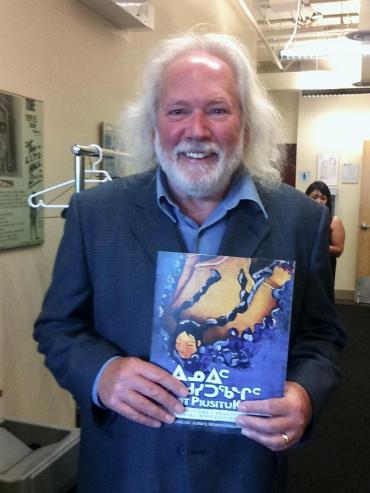For such a time as this
It’s unlikely that when Tom Gordon left Warrensburg, Missouri, with a master of arts degree under his belt, he imagined himself becoming the preeminent expert on Moravian music in Labrador.
Maybe he had an inkling of that distant future when he arrived on the island in 1969. Driving off the ferry and taking in the Genesis chapter 1–style landscape of Newfoundland’s west coast, he had a life-changing epiphany: he was home.
The thunderbolt of love at first sight slowly grew into conviction, and for 30 years he dreamed of the musical utopia he knew existed in Newfoundland and Labrador.
In 2000, that dream became a reality when he was named director of the School of Music — a position he held for 10 years.
During his tenure, Petro-Canada Hall was constructed, new master’s and PhD programs were introduced, and the Music, Media and Place (MMaP) Research Centre was established. He also expanded the school’s national and international profile.
But it was the people, as much as the landscape, who drew Dr. Gordon to the province, and its music and cultural scene shaped his professional path.
Dr. Gordon has shown a deep commitment to fostering artistic collaboration, blending academic music studies with performance-based community projects.
For example, he played a key commissioning and collaborative role with Artistic Fraud, especially in bringing to life Nightingale — a significant musical theatre work about the life of Georgina Stirling.
The play premiered in 2006 under the joint auspices of Memorial University and the Magnetic North Theatre Festival.
Under Dr. Gordon’s direction, Memorial regularly invited school bands, choirs, instrumental groups and opera singers to perform, rehearse and collaborate in campus concert halls.
And he brought the School of Music into the province’s schools. He helped introduce live webcasting from Memorial’s studios to classrooms across Newfoundland and Labrador, enabling real-time teacher-student interaction and expanding music education far beyond the campus.
Dr. Tom Gordon helped establish Tradition and Transition Among the Labrador Inuit, an initiative to protect, preserve and revitalize Labrador Inuit culture and language. Photo from the Gazette.
But Dr. Gordon is not just a musicologist or pianist; he’s a cultural catalyst — best exemplified when he turned his attention to Labrador.
More than 200 years ago, Moravian missionaries arrived in the Big Land and introduced the European sacred music of composers such as Bach, Handel and Mozart to the Inuit of coastal Labrador.
Hymns and anthems were translated into Inuktitut and performed across the coast in Nain, Hopedale, Hebron and Okak. Each church had its own choir and small orchestra, and over time, Inuit musicians transformed this imported music into something that was truly an expression of their culture and everyday life.
Dr. Gordon heard about this music — and went looking for it.
He found 25,000 pages of sheet music that were at once familiar and unique.
Over the years it took to document and digitize this material, Dr. Gordon got to know the music, the communities and their musicians. He sang in their choirs and learned how, from one generation to the next, the music was taught.
His engagement with Labrador Inuit culture was solidified in 2015 when he helped establish Tradition and Transition Among the Labrador Inuit, a $7.4-million research initiative that merged collaborative academic study with traditional knowledge to protect, preserve and revitalize Labrador Inuit culture and language.
This was the first major collaboration between Memorial University and the Nunatsiavut Government.
Dr. Gordon stepped down as the lead of Tradition and Transition in 2017, but he continued as one of its primary researchers. His most recent book, Called Upstairs: Moravian Inuit Music in Labrador, was published in 2023.
Told through archival documents, oral histories of Inuit musicians, and the music itself, Called Upstairs traces the emergence of the Labrador Moravian musical tradition over two and a half centuries.
Dr. Gordon’s journey has been a story of a community united in music. He didn’t just support that community — he became an integral part of it. A true Newfoundlander by choice.
